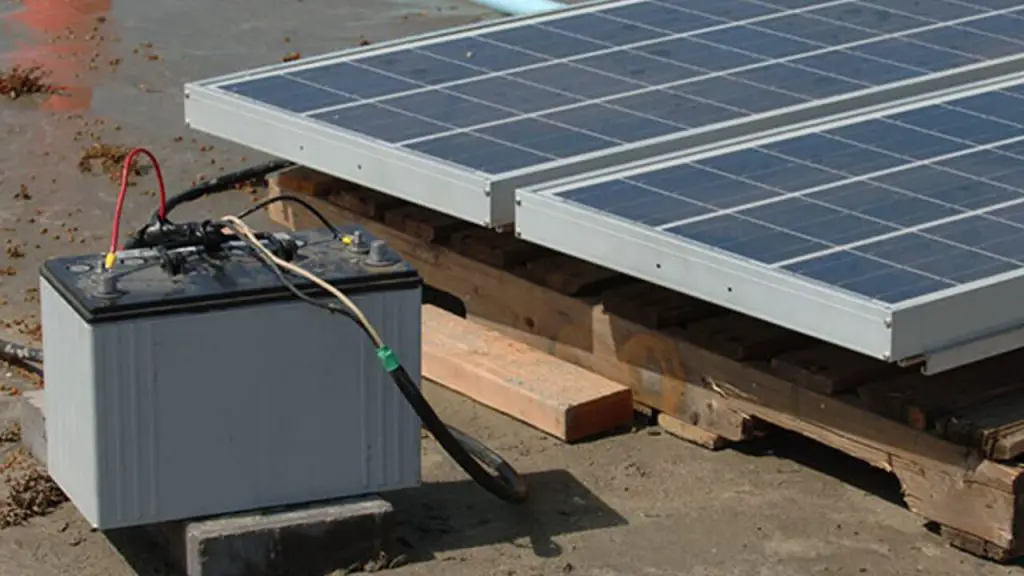Are you considering getting solar energy for your home or business but don’t know where to start? One important factor to consider is the type of battery needed, and specifically, how long it will last.
Solar batteries are an essential part of creating a reliable source of solar energy because they store excess power generated during periods when the sun is shining and then use that stored electricity when the sun isn’t producing enough light.
In this blog post, we’ll take a deep dive into understanding everything there is to know about solar batteries – from types available to their lifespan – so you can make informed decisions. So let’s get started!
What Is A Solar Battery?
Solar batteries are an incredibly useful tool in the quest for renewable energy and sustainability. They are versatile, reliable, and can be used in a myriad of ways.
In essence, a solar battery is simply storage for any excess energy produced by the solar panel, which can then be used later when needed.
Many solar batteries also come with built-in charge controllers that regulate how much electricity is allowed to flow from the panel to the battery, making them a great choice for those interested in both efficiency and cost savings.
Thanks to advances in technology, solar batteries now come in many shapes and sizes and have become increasingly reliable over time; ideal for a variety of applications ranging from residential homes to off-grid living adventures.
Solar batteries make a fantastic addition to any energy system since they provide a safe way to use stored energy whether it’s day or night!
How Long Does A Solar Battery Last?

Although solar batteries may appear to be a one-and-done kind of deal, they can actually last quite a while with minimal maintenance.
How long they last depend on the type of battery you purchase. Monocrystalline lithium batteries are generally estimated to last up to twenty years and have a lifespan of up to 2,500 charge cycles.
On the other hand, lead acid batteries tend to have shorter lifespans, typically lasting between five and eight years.
They are also not as well suited for colder climates and require more frequent extra care like water topping and equalizing charges.
Regardless of the type you choose, it’s important to monitor your solar battery regularly for necessary upkeep and optimal performance.
Luckily, it doesn’t take much time or effort when you’re routinely checking on your sustainable energy source!
Types Of Solar Batteries
Let’s have a look at the types of solar batteries:
1. Lead-acid Solar Batteries
These are the most common type of solar batteries and they are available in gel and wet cell varieties.
These batteries are highly reliable, cost-effective, and easy to maintain. They can be used for both off-grid as well as grid-tied applications.
2. Lithium-ion Solar Batteries
These solar batteries are trending in the market right now because of their high-energy density and lightweight.
They also require virtually no maintenance and they last much longer than lead-acid batteries. However, they are more expensive compared to lead-acid batteries.
3. Nickel Cadmium (NiCd) Solar Batteries
These batteries are mainly used in industrial solar systems and they have a much longer life span than lead-acid batteries.
They can also withstand deep discharges without any damage to the battery. But, they are more expensive compared to other types of solar batteries.
4. Nickel Iron (NiFe) Solar Batteries
These batteries are known for their long life span, and high energy density and they can handle deep discharges.
They are mainly used in off-grid applications and require deficient maintenance, making them a better choice than other solar batteries.
5. Flow Batteries
Flow batteries are relatively new in the market and they offer several advantages over other types of solar storms.
They have excellent cycle life and are highly efficient, making them a good choice for large-scale solar energy projects.
Solar batteries have become an integral component of modern solar energy systems and they can drastically increase the efficiency of your system by providing stored power when required.
With so many different types of solar batteries available in the market, it is important to understand their features and choose the right one to best suit your needs.
Why Use A Solar Battery?
Solar batteries are an eco-friendly way to store energy and reduce electricity bills by utilizing the power of the sun.
Solar batteries are a great investment, as they require minimal maintenance costs, provide reliable power during outages from storms and other disasters, have a long life compared to traditional batteries, and don’t require gasoline or generator refills.
Additionally, using a solar battery can help protect the environment from dangerous emissions produced when generating electricity from non-renewable resources.
Solar energy is becoming increasingly popular as more people seek alternative energy sources for their homes and businesses, making solar batteries an economically sound choice with numerous benefits overall.
Conclusion
Solar panels are a great way to save money on your energy bill, and they’re also good for the environment. Installing them yourself is a relatively simple process, as long as you have some basic carpentry skills.
With a little time and effort, you can soon be generating your own electricity and doing your part to reduce greenhouse gas emissions. Thanks for reading!
We hope this article has helped you learn how to install a solar panel on a roof. If you have any questions or comments, please leave them below.
Latest Posts:



